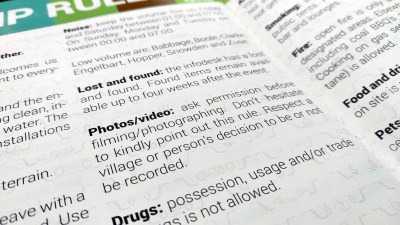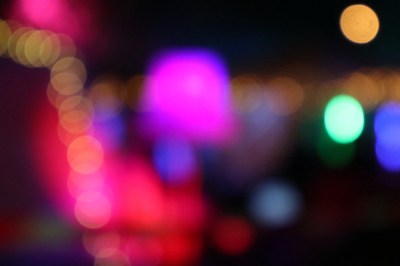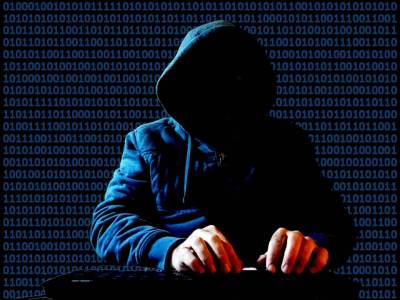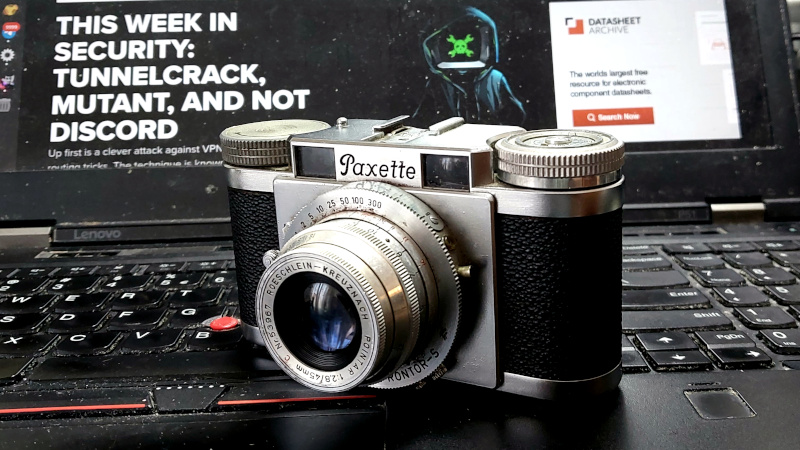One of the fun aspects of our global community is that there are plenty of events at which we can meet up, hang out, and do cool stuff together. They may be in a Las Vegas convention center, a slightly muddy field in England, or a bar in Berlin, but those of us with a consuming interest in technology and making things have a habit of finding each other. Our events all have their own cultures which make each one slightly different from others.
The German events, for example, seem very political to my eyes — with earnest blue-haired young women seeking to make their mark as activists, while the British ones are a little more laid-back and full of middle-aged engineers seeking the bar. There are some cultural things which go beyond the superficial though and extend into the way the events are run, and it’s one of these which I think it’s time we had a chat about.
Our Community Takes Privacy Seriously

The hacker community differs from the general public in many ways, one of which is that we tend to have a much greater understanding of privacy in the online age. The Average Joe will happily sign up to the latest social media craze without a care in the world, while we quickly identify it as a huge data slurp in which the end user is the product rather than the customer.
The work of privacy activists in our community in spotting privacy overreaches may pass unnoticed by outsiders, but over the years it’s scored some big wins that benefit everyone. Part of this interest in privacy appears at our events; it’s very much not done to take a photograph of someone at a hacker event without their consent. This will usually be clearly stated in the code of conduct, and thus if taking a picture featuring someone it’s imperative to make damn sure they’re OK with it.
As a Hackaday journalist, I carry a camera with me. Sometimes more than one: digital, 35 mm, and more recently a hare-brained foray into Super 8. I take a lot of photos at events, because I try to capture the things I think you the readers would like to see. My main interest lies in the hacks, with a lesser one in eye-catching lighting or other spectacles. I always ask permission if a picture might have an identifiable person in it, and sometimes people will say no and either I don’t take the pic, or they obligingly move out of shot while I do. It’s the way this works at our events.
When Privacy Turns To Abuse, That’s Bad

Over quite a few years now I have taken some abuse at our community’s events, for taking photographs of inanimate objects such as light shows, for asking nicely if I can photograph a scene, or sometimes simply for having a camera in the first place. That’s not cool, it’s well out of order, and I think It’s time we had a chat about it. What’s acceptable behaviour and what isn’t for both photographer and random hacker, and then perhaps to dig a little deeper and take a look at why it matters in the first place.
There are many reasons why somebody might not wish to be photographed at a hacker event, I am guessing that there might be people who wouldn’t wish their employers to know what they do in their spare time just to note one example. There are also people who like being somewhere in which constant surveillance isn’t a thing, and there are probably even a few tinfoil-hat-wearers who believe that The Man sends agents with cameras to document their daily lives. Into this come journalists, and knowing first-hand just how badly large-circulation media can malign a group, I can see exactly why the camps themselves want to restrict photography. Here at Hackaday we get some trust at events because of who we are, but when representing Hackaday behind a camera we’re all acutely aware that such a reputation is hard-won but easily lost.
If Your Idea Of Being A Hacker Is This, Stop.

Over the years though I’ve slowly come to the conclusion that there’s another slice of people, and by my observation they also seem to conceal among them the most zealous denouncers of on-site photography. Those are the people who wish to be part of the in-crowd so much that take on board any aspects they find of what they perceive as hacker culture. A decade or two ago one might have seen them using excessive 1337 h4xxx0r-speak in their writing. These are the kind of people who will deride someone for not being a “real” hacker if their field is hardware not infosec, and I have to ask myself whether there is more of the performative than the legitimate in their reactions to anyone with a camera.
The bottom line is this: Our events have a photography restriction for a reason. It’s fantastic to spend a little bit of time outside of the panopticon, and we are also protective of our image as a community in the face of news outlets with the wrong agenda. This is why it’s important that photographers ask before taking pictures of people, and this is, as they say on Mandalor, the Way. So if you’re a camp attendee you have the power not to be photographed without consent, but as always along with power comes responsibility not to abuse it. After all, the whole field of privacy activism is about curbing the abuse of power.
















And your point is? Technical people meet to enjoy a day or two away from corporate world of perfectly staged photographs and fake smiles. If you disagree then don’t participate.
You explicitly state that you don’t see the point, and then you demonstrate for us that the problem is in your reading comprehension, not the author. Great job!
The point is that some people are always looking for a stick to beat other people with, and abuse rules like this to that end. The problem isn’t with the rule, but with the intentions of the people wielding it.
There is no need for a conservation: some have deafness embedded and will abuse rules. With technology enabling high-quality recording within such devices as pens, eyeglasses, keychains, emblems, pendant jewelry and goodness-knows-what-else: the physically obvious camera is reduced to near invisibility.
The issue is the event: if public, photography should be expected, although there are legal concerns for commercial photography for profit. For private events, the organizers should set the rules firmly such that accepting an entry badge or ticket affirms the attendee’s full acceptance of the rules governing the event as well as who is permitted to photograph and where and when. By restricting photography to a time and location window, those wishing to stay anonymous may (attempt) to do so.
Expecting a nation state or government entity to not have spies and record surveillance is foolish: everything is observed in some detail, many in deep detail.
I was the Historian for an Anime convention about 20 years ago; While the convention had a blurb both within the official rules and on the backside of the badges stating that by wearing the badge, you consent to photography by the officials running the convention, the person taking the pictures in an official capacity was.. myself, and an actual professional hired to cover one of the events during the convention.
One of the things I hauled around with my camera was a clipboard and several sheets of paper with spaces for people to write their names, who they were dressed up as. (anime convention. cosplay. You know?) I had additional space reserved for frame numbers and the date for later collation into a self-contained web gallery of the pictures. I always, ALWAYS, **ALWAYS** asked for permission prior to taking individual pictures, unless it was during an event (such as a rave) or in the public areas of the venue, and It was patently obvious that I was taking pictures (monopod, giant camera bag hanging off shoulder, convention badge with committee ribbon on it, etc.).
The few times I took pictures at events that I wasn’t actively working for, I had an altered version of that form that had a space for the people to put in an email address for me to send them a link for their pictures. Again, I also asked **before** taking the pictures. (there was the time were I took pictures for an event at a convention that was 18+, cleared it with the people involved, and the only copies outside of a private archive were sent to the people involved in a secure manner.
I have had a few occasions where people have asked me to delete the pictures I’ve taken of them, which I do, because I have high ethical standards.
It’s inherent in cosplay that one be seen, otherwise what’s the point.
Everyone is carrying a smartphone with a highres camera. People will take pictures regardless of how you feel about it. Privacy in the presence of strangers or near/inside any kind of building is dead.
yeah when i read “we tend to have a much greater understanding of privacy in the online age”, i figured that must mean we know that privacy is obsolete :)
but i feel like OP got there in the end, some people don’t seem to “understand” so much as “rail pointlessly against”
Privacy is obsolete?
Assuming you are American, please post your Social Security Number, your driver’s license number, your bank account numbers, and your Mother’s maiden name.
What? You won’t? Well, I guess privacy isn’t entirely obsolete yet…
I will continue to rail against ignorance such as yours until it is defeated.
“Bad men need nothing more to compass their ends than that good men should look on and do nothing.” – John Stuart Mill
Hacker solution:
A hat with an array of bright IR LEDs aimed in all directions will washout the picture of your head while not being naked eye noticeable.
Bonus:
Hide a camera in the hat.
IR ‘sees through clothes’ one also.
Disable the IR one at hacker cons. Some things cannot be unseen.
Unless you think to use good old film, then the IR is useless.
Don’t depend on IR LEDs to disrupt visible light photography. Furthermore, IR blocking filters exist. Also, even if the image were to be washed out to some extent, postprocessing the image can mostly restore image quality.
Nothing is perfect. It really depends on how close to the camera you are. Was a raw image saved?
Good enough to foil automatic facial recognition gets you a long way.
At some level, it is a big old ‘look at me I’m up to something!’
Everybody should do it routinely. Like strong encrypting you email.
Suggest improvements!
This is HackADay.
Just because it worked in Baby Driver doesn’t mean it’s practical in the real world, throwing out enough IR to wash out a modern camera would be quite hard if not impossible with many camera modules having built-in IR filters.
Ya know… for about the last 541 million years humans and their animal cousins and ancestors have had fleshy cameras with rod and cone shaped cells acting as light sensors and neural computers also made up of cells storing everything those cameras take in with varying degrees of fidelity.
If you really want privacy it is necessary to stay home and away from the windows or at least use curtains. Likewise if you want to use any technology you should make it a point to understand how that tech works and how it might affect your privacy.
I know, this sounds like such a burden, being shut in and monitoring all your own tech use. There is this one really simple trick that most of us use to make it easier however.
We separate those things which we really don’t want others to see and do those things behind closed doors and curtains. And we don’t broadcast them with our technology except maybe using trustworthy encryption. Then when we want to go out and be among people.. we just don’t do those private things.
I know.. it’s crazy right? But it works. It works even better than protesting every new tech that includes a camera and harassing every person who carries one. Must be magic…
That’s exactly the point of mass surveillance and data collection: to discourage people from collaborating in activities that the surveyor wishes to control and limit, by forcing such activities underground, behind closed doors into isolation, using limited technology, not to be communicated to others.
Did you know for example that inkjet and laser printers have been found to lay down small dots to identify whose printer was used? Most people didn’t. “User beware” – right?
https://en.wikipedia.org/wiki/Machine_Identification_Code
The worst part is where you don’t know what will be disallowed in the future and retroactively punished by shifting standards. If privacy is a matter of active camouflage against all possible means and only the person himself is at fault for failing to protect it against intrusions, then you should be paranoid about absolutely everything. Say the wrong word today, get cancelled tomorrow.
Fill you streams with disinformation.
For example: Did you know I’m building a working reproduction of the Tsar Bomba. Including the uranium jacket and cobalt tamper?
I can only get away with that because I fill my streams with the impression that I’m just a grumpy old hacker. Feds read the above and think I’m joking…If a fed reads a lie, is that a crime?
No, but everything you say can be held against you.
Realize you’re not American Dude.
Telling a fed a fishing story is a felony. Best never to say anything to them except ‘lawyer lawyer lawyer’.
Buy printers with cash, or secondhand. Don’t fill out warranty cards or otherwise register your printer.
Better yet, don’t use printers for nefarious purposes.
That’s why I send all my ransom notes with my good old Epson LX-800 dotmatrix printer!
I wish I kept Star Micronics SG-10! Heck I miss fanfeed paper for code! Re-inking anyone?
Oki printers have never been found to participate in the yellow dot marking program.
That isn’t to say they don’t do something else.
There is no such thing as public privacy, if you don’t like the idea that someone may take your picture when you walk out your front door then wear a bag over your head.
Says the paparazzi.
Paparazzi are different from news photographers or general photographers whether professional or amateur. They are a specific variety of nuisance that exists to shock, irritate, and/or harass people, to make people look bad or intimidate them. It is justifiable to oppose such people, and some places have laws against them. Privacy concerns, although related, are different, and it is dishonest to conflate them.
Paparazzi are just exercising the same rights as everyone else to photograph in public. That’s why it’s so difficult to do away with them.
>it is dishonest to conflate them.
Not really. Paparazzi are simply toeing the line of what is legal. They’re essentially “privacy trolls”, and an example of what you get when you argue along the lines of “It’s your fault for not wearing a burka outside the house”.
No one said having freedom was easy, its just better than the alternative.
“Huge data slurp”
Just added to my vocabulary,
Thank you!
‘You have the privilege of not being photographed at these events but I would like you to not use it because it interferes with how I make money’.
That’s what the article sounds like. The only reason Apple doesn’t say this is that they have the power to openly ignore privacy while the author does not.
If you’re in Rome, you’re going to have to adopt to Roman culture. Hacker events, privacy culture is more prevalent. It can be weird and threatening when you come in from outside where people accept that if you’re in public then you’re free game – but that’s just a cultural convention. These people have a different one. Maybe one the rest of us normies should be more willing to adopt?
Did you read the article by any chance? If you had you’d notice it’s about getting abuse for simply having a camera, for asking permission, or for taking photographs of inanimate objects. Not about photographing people without consent.
Carry a hatchet into a bar, people aren’t going to assume you’re a lumberjack.
I carry a gun, concealed, because if I walk into a bank with it on my hip people are – rightly or wrongly – going to get antsy.
You carry a camera into a place full of people who put a strong emphasis on privacy and yeah, some of them are not – again, rightly or wrongly – going to assume you have good intentions. The author needs to accept that he’s coming into *their* cultural space and be ready to adapt their behavior and adapt to other’s behavior.
We do it everywhere else in the world, why not here?
Because you can’t create rules and live in a space where everyone assumes the worst. This is how you end up with a country full of gun nuts and mass shootings despite the fact that most people just wanted a gun for their own purposes – paranoia shouldn’t be encouraged. There’s no need to assume that everyone carrying a camera, or taking photos, is going to use it against you, or in a way that affects you. In fact places that use photos in print, for commercial or public expo (news, stock photos etc) require releases signed by anyone identifiable anyway, those that don’t are likely limited in scope and audience. Regardless – being a person in the hacker space, and a photographer, I like to combine those things – I get photos at events because I like to have them. I accept that people will photograph me. If I didn’t want that, I wouldn’t be going to an event. Simple.
Where do web connected AR glasses (for example) fall in this discussion?
This is an interesting topic, especially the data you collect from your visitors. From your Europaen Union Visitors, because since Yesterday we have stronger Rigths :-D
No, you have no rights. You have a slightly stronger privilege granted by your governments. That is only applicable within those government’s jurisdictions.
Don’t confuse ‘government says I can do it’ with a right. A right is ‘I say I have not given government the authority to stop it’.
If you want to remain anonymous in public, it’s up to you to take measures to ensure that, not mandate everyone around you to cater to your whims. There are things that can be done to optically spoof and disrupt sensors.